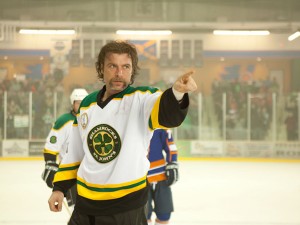Toronto — It’s looking like hockey night in Canada at the Toronto International Film Festival.

In this film image released by Toronto International Film Festival, Liev Schreiber is shown in a scene is from the hockey film "Goon." The film is being presented at the Toronto International Film Festival, running through Sept. 18. AP Photo/Toronto International Film Festival
One of the country’s national sports, hockey is the subject of three films at the prestigious cinema showcase, which opened Thursday and runs through next weekend.
“The Last Gladiators” from Academy Award-winning documentary filmmaker Alex Gibney (“Taxi to the Dark Side”) premiered Friday, offering a portrait of punch-throwing hockey enforcers such as former Montreal Canadiens brawler Chris Nilan.
Premiering Saturday were Michael Dowse’s “Goon,” featuring co-writer Jay Baruchel, Seann William Scott and Liv Schreiber in a the tale of a gentle-spirited hockey enforcer, and Robert Lieberman’s “Breakaway,” whose cast includes Rob Lowe as coach of a misfit team of Sikh-Canadians trying to make their mark in Toronto hockey circles.
“We’re trying to single-handedly create the hockey movie as a genre to match the Western,” said festival co-director Cameron Bailey. “We haven’t had a lot of hockey movies in Canadian filmmaking, but it seems like suddenly, they’re exploding, so we’re just going to ride that as long as we can.”
A year ago, the festival opened with “Score: A Hockey Musical,” a tuneful tale of a teenage hockey prodigy who goes from home-schooled innocent to ice sensation overnight.
Director Gibney, who played hockey in high school and college, said he had a teammate who “went on to the pros. He had a very brief career, but he was not Wayne Gretzky.”
The player was told “if you want to hang around, you might consider getting a little rough,” Gibney said. “That was a devil’s bargain. In order to stay in the pros, where he wanted to be, he had to fight.”
As Gibney set out to make a film about such hockey enforcers, he was drawn to Nilan, whose nickname in the National Hockey League was “Knuckles” and who was a league leader for fighting, racking up 3,000 penalty minutes in a 13-year career.
“The Last Gladiators” examines the difficulties Nilan had adjusting to life after hockey and the physical and emotional toll the sport inflicts on enforcers.
“We go to see these sports in part to enjoy the violence vicariously, yet a lot of these players when done have a hard time when they’re no longer on the ice,” Gibney said. “What do you do when the fighting stops? You’ve learned that frustration can be channeled through this violence, but when it’s over, you’re left with all these violent feelings.”
It’s a timely subject given the recent suicide of former hockey player Wade Belak, which closely followed the deaths of players Derek Boogaard of an accidental mix of alcohol and painkillers and Rick Rypien, who had suffered from depression before his body was found by police after they received a call about a “sudden and non-suspicious” death.
Hockey has been the subject of a handful of Hollywood films, notably Paul Newman’s “Slapshot.” But the sport has never caught on with filmmakers to the extent that baseball, football and basketball have.
The recent seven-game Stanley Cup thriller between the Boston Bruins and Vancouver Canucks has helped stoke fan interest in the sport.
Festival director Piers Handling said that hockey films making the rounds now may have been inspired somewhat by Canada hosting last year’s Winter Olympics in Vancouver, giving the sport a higher profile.
“Hockey is really our sport. We perceive it as our sport,” Handling said. “It’s just in the air right now.”